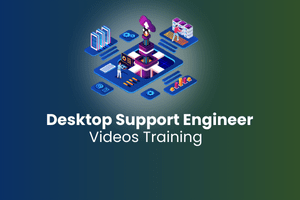Desktop Support Engineer (Computer Hardware, Networking, OS,Virtualization )

About Course
The Desktop Support Engineer Course is designed to provide aspiring IT professionals with the knowledge and skills necessary to excel in the field of desktop support. This comprehensive training program covers a wide range of topics, including hardware troubleshooting, operating system installation and configuration, software management, network connectivity, and user support.
Throughout the course, participants will gain hands-on experience in diagnosing and resolving hardware and software issues commonly encountered in a desktop environment. They will learn how to install and configure operating systems such as Windows and macOS, optimize system performance, and manage software installations and updates.
The course also focuses on essential networking concepts, providing learners with the skills to troubleshoot network connectivity issues, set up and manage network printers, and ensure smooth data communication within an organization.
In addition to technical skills, the Desktop Support Engineer Course emphasizes effective communication and customer service skills. Participants will learn how to communicate technical information clearly and professionally to end-users, provide exceptional customer support, and manage user expectations.
Course Content
Module-1
-
Introduction To DL-1
34:53 -
Introduction to computer hardware
37:50 -
Computer Hardware #2
23:35 -
Computer Hardware #3
40:04 -
Computer Hardware #4
27:26 -
Computer Hardware #5
37:58 -
Computer Hardware #6
24:44 -
Computer Hardware #7
40:03 -
Computer Hardware #8
15:33 -
Computer Hardware #9
39:27 -
Computer Hardware #10
20:57